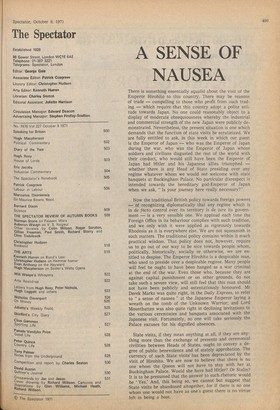A SENSE OF NAUSEA
There is something essentially squalid about the visit of the Emperor Hirohito to this country. There may be reasons of trade — compelling to those who profit from such trading — which require that this country adopt a polite attitude towards Japan. No one could reasonably object to a display of moderate obsequiousness whereby the industrial and commercial strength of the new Japan were publicly demonstrated. Nevertheless, the present sjtuation is one which demands that the function of state visits be scrutinized. We are fully entitled to ask, in this week in which our guest is the Emperor of Japan — who was the Emperor of Japan during the war, who was the Emperor of Japan whose soldiers and civilians disgusted the rest of the world with their conduct, who would still have been the Emperor of Japan had Hitler and his Japanese allies triumphed — whether there is any Head of State presiding over any regime whatever whom we would not welcome with state banquets at Buckingham Palace. No particular disrespect is intended towards the hereditary god-Emperor of Japan when we ask, "Is your journey here really necessary?"
Now the traditional British policy towards foreign powers — of recognizing diplomatically that any regime which is in de facto control over its territory is de jure its government — is a very sensible one. We applaud each time the Foreign Office in its behaviour complies with such tradition, and we only wish it were applied as rigorously towards Rhodesia as it is everywhere else. We are not squeamish in such matters. The traditional policy contains within it much practical wisdom. That policy does not, however, require us to go out of our way to be nice towards people whom, politically, historically, socially or otherwise, we are entitled to despise. The Emperor Hirohito is a despicable man, who used to preside over a despicable regime. Many people will feel he ought to have been hanged as a war criminal at the end of the war. Even those who, because they are against capital punishment or on other grounds, do not take such a severe view, will still feel that this man should not have been publicly and ostentatiously honoured. Mr Derek Marks was quite right, in the Daily Express, to refer to "a sense of nausea" at the Japanese Emperor laying a wreath on the tomb of the Unknown Warrior; and Lord Mountbatten was also quite right in declining invitations to the various ceremonies and banquets associated with the Japanese visit. Fortunately, no one will take seriously the Palace excuses for his dignified absences.
State visits, if they mean anything at all, if they are anything more than the exchange of presents and ceremonial civilities between Heads of States, ought to convey a degree of public benevolence and of stately approbation. The currency of such State visits' has been depreciated by the visit of Hirohito. We are now to believe that there is no one whom the Queen will not have to stay with her at Buckingham Palace. Would she have had Hitler? Or Stalin? It is to be presumed that the answer to such rhetoric would be Yes.' And, this being so, we cannot but suggest that State visits be abandoned altogether, for if there is no one whom one would not have as one's guest there is no virtue left in being a host.










































 Previous page
Previous page